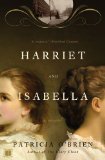Summary | Excerpt | Reading Guide | Reviews | Beyond the Book | Readalikes | Genres & Themes | Author Bio

Someone laughed.
"You haven't proved anything, you just scared the son of a
bitch," the captain said with a chuckle. "All right, climb on. We'll hash it out
on the other side."
The man was still on his knees, his head hanging down between
his arms, which were pulled taut by the connecting chain. He looked like he was
praying, Isabella thought.
"Get up," said the captain. He yanked on the chain, pulling the
slave to his feet. The line moved on again. When the man shuffled past Isabella,
she smelled something strange and acrid, a very different smell from that of
sweat on a hot day. What was she smelling? Suddenly panicked, Isabella began
flailing against the legs of the men pressing forward.
"Hattie, Hattie, where did you go?" she wailed. "Where are you?"
Someone shouted that a child was alone on the dock. Men who had
been focused on the escaped slaves began looking down at her, which only made
her scream louder. One tried to pick her up, and she punched out at him,
refusing touch or help. But then suddenly Hattie's familiar arms were wrapped
around her.
"I thought I lost you, I thought you fell in the water," Harriet
said, holding her tight, her voice shaky with relief.
"I'm sorry, I'm sorry," Isabella sobbed. "I'm sorry I let go."
Later that night, back at home in Walnut Hills, they lay in bed,
hugging each other. "Hattie, what did I smell when those poor people in chains
were going onto the boat? What was it?" Isabella asked.
Harriet pulled her so close, she could feel the thumping of her
heart. "You smelled fear, Bella," she said. "The fear of people who are never
free. It's wrong, it's wrong."
Isabella would remember that talk with Harriet as her first
lesson on the dark contradictions of human souls. Good people turned away from
slavery because they felt no moral obligation to interfere, Harriet said, her
voice trembling with anger. They wanted trade with the South, so they kept
quiet. Hypocrisy was the enemy of truth, she said. It was the coward's way out,
and don't you forget it, Bella.
In the boardinghouse, she wipes her eyes, reminding herself that
brooding only feeds the strange pleasure of melancholy, and she cannot afford
that anymore. She has to believe that Harriet suffers too, otherwise their love
for each other could not have been real, and that would be a travesty. The big
sister who taught her to read at the age of five by holding up word cards, who
patiently coaxed her through learning her sums, who walked her to school each
day for those precious few years she was allowed to attend -- could she truly be
gone? No, it wasn't possible.
But the truth is, her family is gathering today in a house that
has no room for her. In this neighborhood of elegant homes graced with mellow
brownstone stoops and finely wrought iron balustrades, she sits in a room with
mouse droppings. On the sidewalk, the reporters think of her as the shunned
daughter of the famed Beecher family. The pariah. What an irony that her
banishment came for telling the truth.
"I am not crazy," she whispers into the air. "No matter who says
so."
She hears something new from outside, a different sound. A
snatch of song? Isabella goes back to the window and gazes across the street in
the direction of Plymouth Church. She glances again at the sidewalk in front of
Henry's house and sees the bowler hats watching a strange-looking creature
perform some kind of dance. She rubs her eyes. It cannot be. But yes, a man
dressed as a caricature of Uncle Tom, his face darkened with lampblack and burnt
cork, his lips wide, thick, and painted a gleaming white, is prancing before the
Beecher home.
Beecher, Beecher is my name -- Beecher till I die!
I never kissed Mis' Tilton -- I never told a lie!
"Go away, you stupid fool!" she screams before she can stop
herself. She sticks her fist out the window and shakes it, venting her rage,
only to see the figure in blackface dance away down the street, followed by the
guilty chuckles of the bowler hats.
Copyright © 2008 by Patricia O'Brien.
Fanaticism consists in redoubling your effort when you have forgotten your aim
Click Here to find out who said this, as well as discovering other famous literary quotes!
Your guide toexceptional books
BookBrowse seeks out and recommends the best in contemporary fiction and nonfiction—books that not only engage and entertain but also deepen our understanding of ourselves and the world around us.